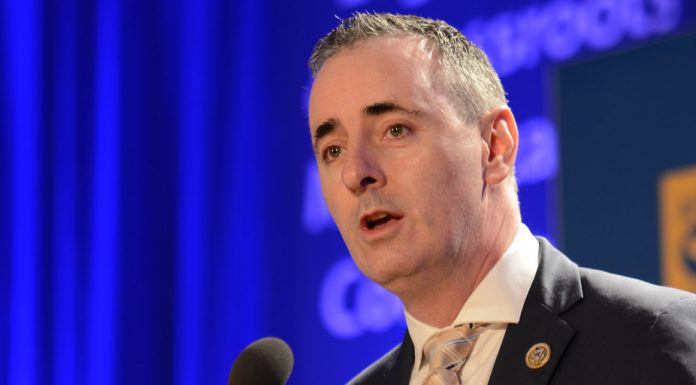() A new bill pending in Congress would mandate open primaries across the country, giving roughly 23.5 million registered independents a chance to nominate candidates for federal office.
The Let America Vote Act, sponsored by Rep. Brian Fitzpatrick, R-Pa., and cosigned by Reps. Jared Golden, D-Maine; Andrew Garbarino, R-N.Y.; and Marie Gluesenkamp Perez, D-Wash., would impact 22 states where primary elections remained closed to registered party members.
“This commonsense reform is not political nor controversial,” Fitzpatrick said Monday on X. “It secures the fundamental right of every American citizen to vote, regardless of political affiliation, while safeguarding election integrity by prohibiting noncitizens from participating in tax-payer-funded elections.”
This commonsense reform is not political nor controversial.https://t.co/hBtY8wvWyC
— Rep. Brian Fitzpatrick 🇺🇸 (@RepBrianFitz) August 12, 2024
Fitzpatrick is considered to be one of the farthest-left leaning Republicans, and Pennsylvania is a closed-primary state, meaning Democrats and Independents would have to register as Republicans to support him.
According to Unite America, only 8% of eligible voters elected 83% of the members of the U.S. House of Representatives in 2022. So far this year, the organization says, 5% of voters have chosen 62% of the chamber.
Nick Troiano, the organization’s executive director, described the legislation as the “single greatest expansion of voting rights” since the voting age was lowered in 1971.
“At a time when a majority of voters identify as independent—including a majority of veterans who fought for our country and a majority of young people who are the future of our country—it’s unconscionable that closed primaries deny nearly 24 million unaffiliated Americans the right to vote in taxpayer-funded elections this year,” he claimed.
“This Act would end taxation without representation once and for all, and ensure every voter, regardless of party, can fully exercise their right to vote,” he added.
Critics say only party members should select nominees, refuting the claim that doing so puts more ideologically extreme candidates on the ballot by pointing to the fact that having members of the opposing party help select them tends only to boost the weakest candidates.
South Carolina, the state of former Republican primary challenger Nikki Haley, offers a shining example. Although considered to be one of the more conservative states, its reliance on open primaries has supported those like Haley, along with Sens. Lindsey Graham and Tim Scott, whose priorities do not necessarily align with the majority of South Carolinians.
Chris Tohir, in a 2023 policy brief for the Connecticut-based Yankee Institute, says of closed primaries, “if it ain’t broke, don’t fix it.”
“American politics has a strong history and tradition of the power and autonomy of political parties to elect their own candidates with minimal interference,” he wrote. “Requiring that someone be a party member to vote in a primary is not disenfranchisement—it is freedom of association.”

